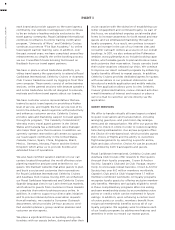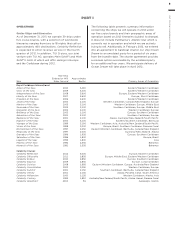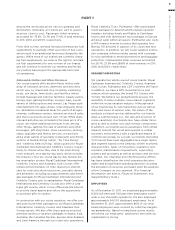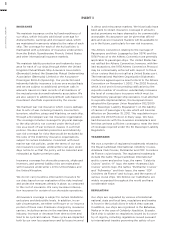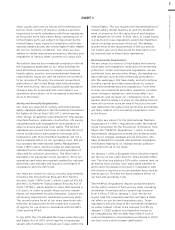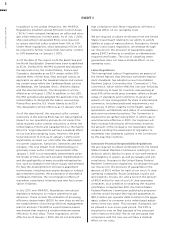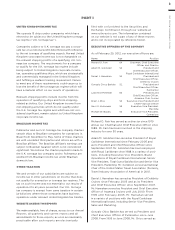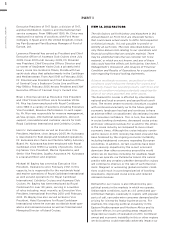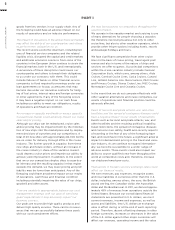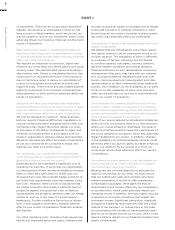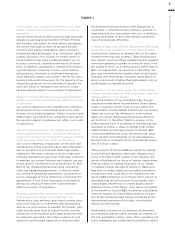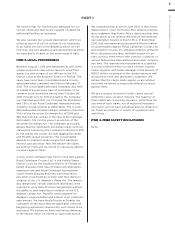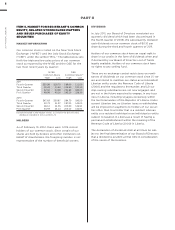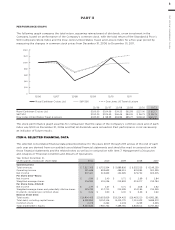Royal Caribbean Cruise Lines 2011 Annual Report Download - page 32
Download and view the complete annual report
Please find page 32 of the 2011 Royal Caribbean Cruise Lines annual report below. You can navigate through the pages in the report by either clicking on the pages listed below, or by using the keyword search tool below to find specific information within the annual report.
2011 ANNUAL REPORT 28
PART I
Executive President of TNT Spain, a division of TNT,
a global distribution, logistics and international mail
service company. From 1986 until 1995, Mr. Chico was
employed in a variety of positions with Ford Motor
Company in Spain and in the United Kingdom, includ-
ing Pan-European Fleet Business Manager of Ford of
Europe, Ltd.
Lawrence Pimentel has served as President and Chief
Executive Officer of Azamara Club Cruises since July
2009. From 2001 until January 2009, Mr. Pimentel
was President, Chief Executive Officer, Director and
co-owner of SeaDream Yacht Club, a privately held
luxury cruise line located in Miami, Florida with two
yacht-style ships that sailed primarily in the Caribbean
and Mediterranean. From April 1991 to February 2001,
Mr. Pimentel was President and Chief Executive Officer
of Carnival Corp.’s Seabourn Cruise Line and from
May 1998 to February 2001, he was President and Chief
Executive Officer of Carnival Corp.’s Cunard Line.
Brian J. Rice has served as Executive Vice President
and Chief Financial Officer since November 2006.
Mr. Rice has been employed with Royal Caribbean
since 1989 in a variety of positions including Executive
Vice President, Revenue Performance. In such capac-
ity, Mr. Rice was responsible for revenue management,
air/sea, groups, international operations, decision
support, reservations and customer service for both
Royal Caribbean International and Celebrity Cruises.
Harri U. Kulovaara has served as Executive Vice
President, Maritime, since January 2005. Mr. Kulovaara
is responsible for fleet design and newbuild operations.
Mr. Kulovaara also chairs our Maritime Safety Advisory
Board. Mr. Kulovaara has been employed with Royal
Caribbean since 1995 in a variety of positions, includ-
ing Senior Vice President, Marine Operations, and
Senior Vice President, Quality Assurance. Mr. Kulovaara
is a naval architect and engineer.
Michael W. Bayley has served as Executive Vice
President, Operations since February 2012. In this
capacity, he is responsible for the worldwide hotel
and marine operations of Royal Caribbean International
as well as land operations for Royal Caribbean
International, Celebrity Cruises and Azamara Club
Cruises. Mr. Bayley has been employed by Royal
Caribbean for over 30 years, serving in a number
of roles including, most recently, as Executive Vice
President, International from May 2010 until February
2012. Mr. Bayley has also served as Senior Vice
President, Hotel Operations for Royal Caribbean
International where he oversaw worldwide hotel oper-
ations and onboard revenue as well as Chairman and
Managing Director of Island Cruises.
ITEM 1A. RISK FACTORS
The risk factors set forth below and elsewhere in this
Annual Report on Form 10-K are important factors
that could cause actual results to differ from expected
or historical results. It is not possible to predict or
identify all such risks. The risks described below are
only those known risks relating to our operations and
financial condition that we consider material. There
may be additional risks that we consider not to be
material, or which are not known, and any of these
risks could have the effects set forth below. See Item 7.
Management’s Discussion and Analysis of Financial
Condition and Results of Operations for a cautionary
note regarding forward-looking statements.
Adverse worldwide economic, geopolitical or other
conditions could reduce the demand for cruises and
adversely impact our operating results, cash flows and
financial condition including potentially impairing the
value of our ships, goodwill and other assets.
The demand for cruises is affected by international,
national and local economic and geopolitical condi-
tions. The recent severe economic downturn coupled
with continued uncertainty as to the future global
economic landscape has had and continues to have
an adverse effect on vacationers’ discretionary income
and consumer confidence. This, in turn, has resulted
in cruise booking slowdowns, decreased cruise prices
and lower onboard revenues for us and for the others
in the cruise industry as compared to more robust
economic times. Although the cruise industry contin-
ued to recover in 2011, recovery has been slow and has
been hindered by the ongoing economic instability,
including heightened concerns regarding European
economies. In addition, certain countries have been
more severely impacted by the recent economic
downturn than other economies around the world
where we do business including, for example, Spain
where we operate our Pullmantur brand. We cannot
predict with any certainty whether demand for cruises
will continue to improve or the rate of such improve-
ment. Stagnant or worsening global economic condi-
tions could result in a prolonged period of booking
slowdowns, depressed cruise prices and reduced
onboard revenues.
Demand for our cruises is also influenced by geo-
political events in the markets in which we operate.
Unfavorable conditions, such as civil unrest and gov-
ernmental changes, especially in regions with popular
ports of call, can undermine consumer demand and/or
pricing for itineraries featuring these ports. For
example, the ongoing political instability in the
Eastern Mediterranean and Northern Africa and its
spillover effects in surrounding areas negatively
impacted our results of operations in 2011. Continued
unrest and economic instability in this or other regions
we do business could materially adversely impact our


